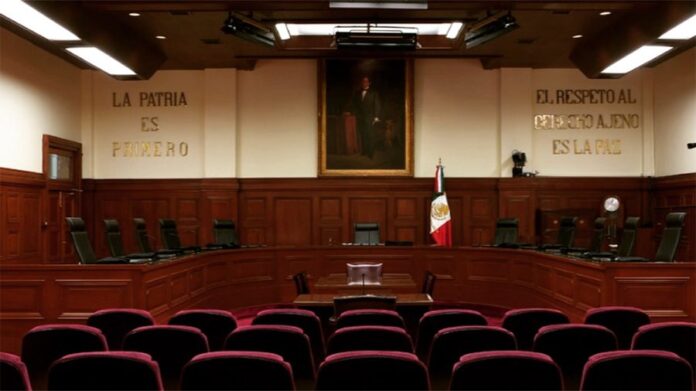The President of Mexico presented in February 2024 a Constitutional Reform bill to the Federal Judiciary of great magnitude. One of the transcendental points of the reform is that Judges, Magistrates and Ministers will be elected by popular vote, and those elected will replace the current judges in office. According to the President, a fundamental change is imperative for the Federal Judiciary, which has constantly issued statements criticising and stigmatising the Federal Judiciary and judges. Such statements have prompted international organisations to express their concern about their possible negative effects on judicial independence. In this controversial context, the Reform arises, which proposes serious changes for the judiciary, both at the federal and local levels. This article provides a legal analysis of the Reform on its main proposals that are considered incompatible with judicial independence.
Importance of Judicial Independence
Before analysing the problematic points of the Reform, it is important to highlight the importance of judicial independence. This guarantee is related to the human right to be heard by an independent and impartial tribunal. In short, it implies that judges can rule according to law and impartially, without undue interference or political interference. Moreover, the independence of the judiciary is fundamental to guaranteeing the rule of law and democracy. Because of its importance, international law has recognised that States are obliged to ensure and protect the independence of the judiciary and its judges. Thus, judicial independence is not a privilege for judges, but a guarantee that allows them to fulfil their obligation to dispense justice and protect human rights. Therefore, any attack on judicial independence harms the protection of human rights and weakens the rule of law.
Analysis of the Proposals
The Reform contains a series of structural changes to the federal judiciary that will also influence the States and Mexico City judiciaries. The following section analyses in detail the 7 modifications that are considered most problematic for judicial independence, based on international and constitutional law.
1. Renewal of all Federal Judges, Magistrates, Ministers and Members of the Federal Judiciary Council, and changes in the composition of the Supreme Court.
Proposal
One of the proposals of the reform is to replace all federal Judges Magistrates, and Supreme Court Ministers with judges elected by popular vote. In addition, changes are proposed to the structure and composition of the Supreme Court and the term of office of the Ministers. It is also envisaged to eliminate the Federal Judiciary Council. Therefore, the current Members would also end their term of office.
Review of national and international law
An essential guarantee of judicial independence is the irremovability of judges, as recognised in both national and international law. Essentially, irremovability means that judges are guaranteed tenure of office until the end of their appointment or until they reach retirement age. In addition, they may only be dismissed for serious grounds of misconduct or incompetence. However, there must first be a procedure that respects the rules of due process or fair trial. Furthermore, the decision must be subject to review by an independent body. The guarantee of irremovability also applies to members of the Councils of the Judiciary. International courts and bodies have recognised that collective dismissal of judges in an arbitrary manner or legal reforms that result in early termination of office violate judicial independence.
Analysis: The Reform would lead to a massive dismissal of judges and members of the Council in violation of the guarantee of irremovability and judicial independence.
The reform would lead to the mass dismissal of federal judges and Council members without any of the valid grounds for dismissal. That is, they engage in serious disciplinary misconduct or show incompetence for the position and their dismissal is preceded by a procedure with all judicial guarantees and with the possibility to challenge the decision. Nor is it the case that judges terminate their appointment or reach retirement age. On the contrary, by constitutional mandate, judges would automatically be removed from office once their replacements are elected and take office. This is therefore an arbitrary collective dismissal that is contrary to the guarantee of irremovability and judicial independence.
2. Popular election of Judges, Magistrates and Ministers of the Federal Judiciary, as well as local Judges and Magistrates.
Proposal
The Reform seeks to transform the way judges are appointed in Mexico, both at the federal and local levels. Appointment of federal judges is characterised by rigorous and highly competitive contests. The proposal is that all judges would now be appointed by popular vote. Candidates would be nominated by the legislative, executive and judicial branches.
Review of national and international law
International instruments, human rights jurisprudence and the opinion of international advisory bodies indicate that the appointment of judges should be based exclusively on their merit and professional aptitudes, as well as on qualities such as impartiality and independence. Furthermore, judicial independence requires that selection processes be based on objective criteria in which the skills and qualities of the candidates are evaluated. Likewise, the Mexican Constitution requires that the appointment of Judges must be based on suitability. Thus, it should be noted that international bodies have considered that the popular election of judges potentially jeopardises their impartiality and is problematic for judicial independence. They have therefore recommended adopting instead a merit-based system of appointment of judges.
Analysis of the Reform: The method of designation of judges proposed does not guarantee their suitability, impartiality and independence.
The Reform proposes an inadequate mechanism for the appointment of judges that will not ensure their independence and impartiality, nor is it based on merit or the person’s suitability for the position. As required by international human rights standards and the Constitution. For, a popular election of judges is not based on merit, as their appointment will be derived from the candidate who receives the most votes, and not necessarily the most qualified. There will be no evaluation of their abilities. Nor will there be an open call for all citizens on equal terms to participate in a competition for the position.
On the contrary, the number of votes is the fundamental requirement for appointment, not the person’s skills or suitability. Moreover, it compromises the impartiality of judges in favour of those who supported them for the appointment. Thus, there is no guarantee that the Courts are composed of the most suitable persons so that the jurisdictional body has the technical capacity to impart adequate justice. This is in contravention of judicial independence and the human right of access to an independent and impartial court.
3. Elimination of the retirement pension of the Ministers of the Supreme Court of Justice of the Nation.
Proposal
The Reform proposes to eliminate the retirement pension for both current and future Supreme Court Justices. Currently, the Constitution establishes that Supreme Court Justices will serve for 15 years, at the end of which they will receive a retirement pension. The Organic Law of the Federal Judiciary provides that this retirement benefit shall be for life.
Review of national and international law
International instruments and bodies have recognised the importance of an adequate pension or compensation to protect the independence of judges. According to the jurisprudence of the Mexican Supreme Court, the retirement pension is an essential constitutional guarantee that protects the function of judges and guarantees their independence. The jurisprudence of the other National Apex Courts corroborates the universal consensus on the importance of protecting this right and social security guarantee to safeguard judicial independence.
Analysis of the Reform: Judicial independence would be contravened by not guaranteeing a pension to Supreme Court Justices.
A judge who is not guaranteed a secure financial future has his or her stability affected and may undermine his or her independence. Any attempt to affect or extinguish his or her right to retirement at the end of his or her term of office would result in an attack on the independence of the judiciary. Therefore, eliminating the retirement payment for Ministers of the Supreme Court disregards a constitutional and conventional guarantee that is transcendental to ensure the independence of judges. It is a transgression of the principles of stability and irremovability and a step backwards in the protection granted to Ministers.
4. The irremovability of federal judges and magistrates is removed.
Proposal
The Mexican Constitution currently recognises that District Judges and Circuit Magistrates will acquire their irremovability when they are ratified in office. That is to say, once appointed, they will last 6 years and if ratified, their appointment will be permanent, and they can only be removed for the reasons foreseen and under the procedure determined in the Law. However, the Reform now proposes a permanent provisional status for Judges and Magistrates. Given that their term of office will last 9 years, at the end of which they will be eligible for re-election.
Review of national and international law
There is a consensus in international instruments that judges should enjoy security of tenure until retirement age or the end of the term of appointment. Some instruments agree that tenure until retirement age should be preferred. While international bodies have indicated that the provisional status of judges is problematic for judicial independence, especially when it is widespread. For its part, the Mexican Supreme Court has established that the possibility for judges to acquire irremovability after being ratified is a constitutional guarantee. In addition, a Commission formed by the American Bar Association has considered that the re-election of judges is problematic for judicial independence, because judges, to be re-elected, may feel pressured to rule according to what is politically popular rather than what the law dictates.
Analysis of the Reform: abolishing the irremovability of federal judges violates judicial independence.
A judge who is subject to popular re-election, without stability in office, will be under great pressure to rule according to what is politically more popular and not according to the Constitution. The Reform represents a major step backwards by eliminating the possibility of acquiring irremovability in office. This will subject judges to undue pressure in order to be re-elected. Therefore, an indefinite system of re-election of federal judges and magistrates is contrary to the guarantees of stability and irremovability in office and consequently violates judicial independence.
5. A Judicial Disciplinary Tribunal is established whose decisions shall be final and not subject to appeal.
Proposal
The Reform proposes the creation of a Disciplinary Tribunal to replace the Judiciary Council, to assume disciplinary functions. Nonetheless, it is proposed that the decisions of this tribunal cannot be reviewed by any other body.
Review of national and international law
International instruments and UN expert opinion agree that judges should be guaranteed the possibility of independent review of the decisions issued by disciplinary bodies. This should preferably be done by a higher judicial authority. Therefore, the review of the decisions of the disciplinary body is a guarantee of the independence of judges.
Analysis of the Reform: A Disciplinary Tribunal without the possibility to review its decisions is a clear transgression of the independence of judges.
The importance of ensuring that the decisions of a disciplinary body can be reviewed lies in allowing the judge an adequate defence. In order to prevent arbitrary decisions from unduly interfering with the judge’s judicial independence. Consequently, the proposal to remove any possibility of reviewing disciplinary decisions against judges implies a reduction of their guarantees and, therefore, a transgression of judicial independence.
6. The Judicial Disciplinary Tribunal may sanction judges for acting against the public interest.
Proposal
The Reform proposes to make acting against the public interest a ground for sanctioning judges. The current constitutional framework regulates the liability of judges based on the rules of administrative liability.
Review of international law
Under international law, it is possible to impose disciplinary measures on judges when they fail to comply with defined standards of judicial conduct. However, judges should not be sanctioned for the content of their decisions, judicial errors or for criticising other courts. It has also been held that vague and ambiguous grounds for disciplinary sanctions against judges allow for overly broad or abusive interpretations that undermine judicial independence.
Reform Analysis: “Acts contrary to the public interest” is a vague ground that will undermine the independence and impartiality of judges and obstruct the protection of human rights.
Affecting the public interest, as a ground for sanction, is a vague and ambiguous ground. It will lead to broad and arbitrary interpretations against judges. It will leave them defenceless, as they will not have clear knowledge of what conduct does or does not constitute an act contrary to the public interest. Moreover, it is not a valid ground for sanctioning a judge, as it does not relate to a standard of judicial conduct. It would involve reviewing whether a judge’s ruling did not bring about results contrary to the ‘public interest’. Even more seriously, this ground for liability is incompatible with the constitutional duty of amparo judges to protect human rights.
The Constitution does not prohibit protecting a person from an unconstitutional law or act when it contradicts the ‘public interest’. Nonetheless, with this cause of liability, judges would face a dilemma and immense pressure. If the judge finds a law to violate human rights, he or she would be faced with the choice of complying with the Constitution and granting protection to the affected person or, contrary to his or her constitutional obligations, denying the protection for fear of being sanctioned for ‘going against the public interest.’, as defining public interest is very ambiguous and vague.
For example, a law can generally be in the public interest, as the Supreme Court has recognised. Moreover, the design and form in which members of the Disciplinary Tribunal are to be appointed, and the impossibility of having their decisions reviewed would potentially lead to arbitrary, impartial, and unassailable judgments. This would undoubtedly undermine the independence and impartiality of judges and would be a monumental step backwards in the protection of human rights.
7. The Federal Judiciary is prohibited from creating trusts and is ordered to extinguish existing trusts and allocate the resources to the Pension Fund for Welfare.
Proposal
It is proposed in the Reform that the Trusts of the Federal Judiciary that are not contemplated in the law should be extinguished in 90 days, to be destined to the eventual Pension Fund for Welfare.
Review of national and international law
International law has agreed that autonomy in the management of funds and a sufficient budget is part of judicial independence. Different national courts have identified the insufficient allocation of resources to the judiciary and interference in its budgetary management as a violation of its independence and proper functioning. The Mexican Supreme Court has also considered the autonomy of the judiciary to manage its budget as a necessary condition for its independence.
Analysis of the Reform: the elimination of the Trusts is an interference in the autonomy of the budgetary management of the Federal Judiciary.
The trusts of the Federal Judiciary, as reported by the Supreme Court, among other functions, are intended to cover the payment of employment benefits. Some of them are also intended to finance the refurbishment of courts and to publicise Supreme Court rulings and publications. Therefore, the Reform contains an undue interference in the autonomy of the judiciary’s budgetary management and its appropriate funding. It is intended to capture resources administered by the Judiciary for its operation, to be used for purposes set by the other branches of government. This would consequently jeopardise its proper functioning. Therefore, the Reform would imply an interference in the budgetary administration autonomy of the Federal Judiciary, which in turn disrupts its adequate allocation of resources.
Conclusion
The judicial reform presented by the federal executive poses serious setbacks to judicial independence, autonomy, and impartiality, which will have serious effects on the effective protection of human rights. Each one of the proposals analysed here represents a serious infringement of judicial independence. A judiciary without independence and impartiality would be seriously detrimental to society and the rule of law. It is therefore essential to ensure that any changes to the judiciary are based on open debates and in strict adherence to constitutional principles and international human rights standards. In order to guarantee and strengthen its independence and autonomy. The Reform must be reviewed and amended under the parameters established in constitutional and international law.
Check the complete report (Spanish)
The following report provides a more detailed analysis of the Judicial Reform’s problematic approach to judicial independence. It also details and exposes the legal foundations and sources that support this article. (Only in Spanish)






